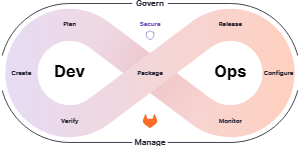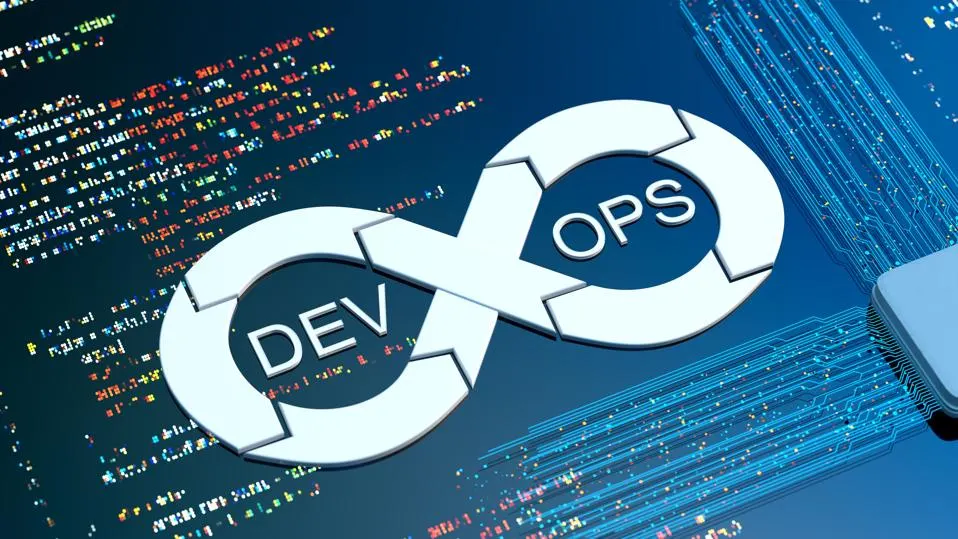Enrolling in a post-graduate tech program is great when you want to add value to your resume and upgrade your skills. But are you wondering what to study? A post-graduate certification in DevOps would be a good choice, given that DevOps has revolutionized how the software industry operates and there is a constant demand for DevOps professionals.
The best way to gain DevOps skills is to join a post-graduate program conducted by a reputed organization. A quality post-graduate program in DevOps would give you an overview of DevOps fundamentals and teach you niche skills that will make you industry-ready. The Caltech Post Graduate Program in DevOps is a professional development program designed by Caltech CTME, which will give you both theoretical and practical training in DevOps.

Source: GitLab
The Growing Popularity of Post-Graduate Programs in DevOps
DevOps has revolutionized how the industry views the Software Development Life Cycle. Software production and operations are no longer linear processes. The software industry has recognized the value and importance of integrating both processes to achieve superior software delivery.
The global DevOps market is expected to reach USD 32.7 Billion by 2028. This implies that there is a constant demand for expert DevOps professionals. Several reputed institutions have introduced tailor-made post-graduate programs in DevOps to meet this demand.
Here are the reasons that explain the increasing popularity of post-graduate programs in DevOps.
Rising Demand for DevOps Skills
- Besides Information Technology, DevOps professionals are growing in demand across several industries, such as Banking, Manufacturing, Telecommunications, Healthcare, and Media Entertainment.
- There has been a rise in the demand for DevOps professionals due to increased remote working after the COVID-19 pandemic.
Adoption of Cloud Services
- Cloud services have grown in popularity because they enable seamless working between various teams not present in the exact location.
- The growing popularity of cloud services has made it essential to train people who can work on niche technologies such as serverless computing and containerization technologies.
- DevOps enables better integration of cloud services.
Extensive Adoption of Automation
- Automation can single-handedly speed up the software delivery process and reduce the chances of errors.
- One of the primary principles of DevOps is automation, and it has several tools, such as Terraform and Ansible, that competently handle repetitive activities, freeing up resources for other productive tasks.
Career Growth and High Salary Potential
- Knowledge of DevOps, a groundbreaking methodology that encourages efficient software delivery, increases productivity, and cuts costs, adds value to any resume.
- Organizations are looking to hire software professionals who have multiple skills. Apart from core coding and superior programming skills, companies are looking to hire persons who contribute in other ways to improve their business.
- A skilled DevOps professional can expect an average salary of around $1,30,000.
- DevOps involves complete knowledge of software development’s delivery and operations aspects. This broadens the job prospects of individuals across industries. It also paves the way for vertical career growth into leadership roles.
What Can a Good Post-Graduate Program in DevOps Teach You?
Before filling out the application forms to join a PG program in DevOps, you must understand what you can expect to learn from the course.
Here is a broad list of course contents of a good quality DevOps course
- Overview and Fundamentals of DevOps Methodology
- Continuous Integration / Continuous Delivery
- Continuous Deployment
- Containerization
- Configuration Management
- Testing
- Security
- Automation
- DevOps tools such as Git, GitHub, Ansible, Chef, Docker, Maven, AWS
- DevOps on cloud platforms
Prerequisites for a Post-Graduate Program In DevOps
Let’s look at some of the prerequisites of a post-graduate program in DevOps to see if it will suit your goals and career aspirations.
- A Bachelor’s degree is an essential requirement to enter a post-graduate program.
- It’s ideal to have a background in programming with knowledge of coding in a scripting language such as Java or Python. Understanding Operating Systems and Networking is an added advantage.
- Work experience is not mandatory for admission to a post-graduate program in DevOps.
DevOps is about more than just studying niche technical skills. To be a good DevOps engineer, you also need –
- Logical thinking and problem-solving abilities.
- Collaborative spirit and excellent communication skills.
- Open-mindedness and a keenness to keep learning.
Choosing the Right DevOps Course
While choosing a DevOps course, you must pick one that suits your current skill level and career path. Consider the following important factors while you compare courses.
Course Curriculum: There are plenty of DevOps courses in the market. You should pick one that has an updated curriculum that will make you industry-ready. You can use the course content list given above to start your research.
Format of Instruction: DevOps courses are offered offline/online or hybrid. Your commitments, schedules, and personal preferences will determine your chosen mode.
Project Training: A good DevOps program will offer plenty of real-life training opportunities so that you, as a student, develop the right skills in the classroom and in practical situations.
Credentials of the Course Provider: Verify the reputation of the course provider, along with the quality of the instructor. Ensure that the instructor has an industry background and can enrich your learning experience with real-life examples.
Duration of the Program: Short-term courses DevOps last 3-6 months, while medium-term courses last 9-12 months. Evaluate if the program’s length matches your career path and plans.
Finance: The cost of the course versus the monetary benefits you can gain from it should be part of the evaluation you undertake to decide on the course.
Placement Assistance: Look for a course that offers job assistance and check out the companies past students have been placed at, along with their pay packages.
Career Prospects after a PG in DevOps
What are your career options after a post-graduate program in DevOps?
- DevOps Engineer
- DevOps Architect
- DevOps Cloud Engineer
- Integration Specialist
- Site Reliability Engineer
A post-graduate certification in DevOps can open doors to several specialist roles, such as Data Scientist and Security Analyst, besides leadership roles as Release Manager and IT Operations Manager.
Conclusion
A post-graduate program will teach you skills to boost your salary and improve your job prospects. Investing in a structured and intense post-graduate program in DevOps can be one of the best career decisions if you have an interest and passion for learning a state-of-the-art, sophisticated methodology of software delivery. Your investment is bound to reap rich rewards both in terms of financial benefits and a future-proof career path.
